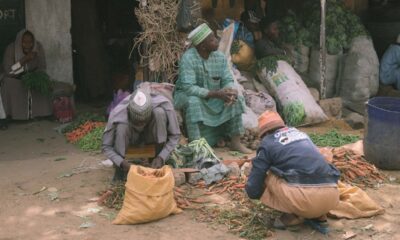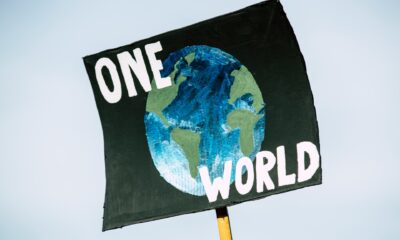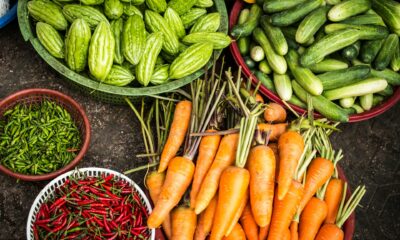Africa
The “Weoog-Paani” Project in Burkina Faso Had an Implementation Rate of 70% in 2022
According to the coordinator of the Weoog-Paani project, Alexis Sompougdou, the project has recorded an implementation rate of about 70%. This rate, he said, has been impacted not only by the security crisis but also by the dissolution of municipal councils and the establishment of special delegations, the gateway to the project.

The Weoog-Paani Project through which local actors work together to plant trees in Burkina Faso has had good results.
The actors involved in the implementation of the local governance of forest resources project “Weoog Paani” met on February 9th and 10th, 2023 in Ziniaré, to plan the implementation of activities for the year 2023, drawing lessons from the activities carried out in 2022, in a context of a security crisis.
To sustainably improve the living conditions of rural populations through the promotion of local governance of forest resources, investments in forests, and the valorization of non-timber forest products. This is the objective of the Weoog-Paani project (new forest in Mooré and Gulmanchee), which is being carried out in 25 communes in four regions of Burkina Faso, including the North, East, South-Central, and East-Central regions.
Read more on the subject and discover the latest economic news of the day with the Born2Invest mobile app.
The Weoog-Paani project has recorded an implementation rate of about 70% in Burkina Faso
Financed by the Swedish cooperation and implemented by a consortium of NGOs (Netherlands Development Organization (SNV), United Nations Capital Development Fund (UNCDF), Action Research Group on Forest Governance) led by the NGO Tree Aid, the project has carried out several activities. These include the planting of more than one million seedlings, the construction of more than one hundred water collection and retention tanks, and the structuring and capacity building of non-timber forest product stakeholders to develop a sustainable and resilient market system.
According to the coordinator of the Weoog-Paani project, Alexis Sompougdou, the project has recorded an implementation rate of about 70%. This rate, he said, has been impacted not only by the security crisis but also by the dissolution of municipal councils and the establishment of special delegations, the gateway to the project.
“This annual meeting is a first exercise in relation to the current context. We are in a difficult situation and it is important that the reflection can be carried out, and that the actors discuss the best ways to adapt to continue the project. We need to develop strategies for more resilience and adaptation to the context,” said Sompougdou.
“This is a project that we built for ten years. It was actually initiated in 2007 and this shows that there are satisfactory results that make the technical and financial partners still accompany the initiative. We are at a cruising speed that deserves that we maintain the course”, said the project coordinator.
Beginning in June 2019, the first phase of implementation will end on May 31, 2024
Present at the opening of the workshop, the Director of Forests and Reforestation, Colonel Bertrand Tapsoba, praised the significant contribution of the Weoog-Paani project. “The Ministry of the Environment is closely following this project. We have a protocol for monitoring the activities carried out. Tree Aid and its partners have been able to plant thousands of seedlings on protected sites and the survival rate of these seedlings is not negligible,” boasted Bertrand Tapsoba.
In view of the security context that makes it difficult to access some sites covered by the project, the director of forests and reforestation expressed the wish to refocus the project to add new sites more accessible to strengthen the capacity of agents to be more resilient.
Beginning in June 2019, the first phase of implementation will end on May 31, 2024. The second phase is expected to begin in 2024 and run through 2028. According to the Weoog-Paani project coordinator, Alexis Sompougdou, the year 2023 will also be devoted to reflection for the development of this second phase in order to have continuity in the actions.
__
(Featured image by NASTER via Pixabay)
DISCLAIMER: This article was written by a third party contributor and does not reflect the opinion of Born2Invest, its management, staff or its associates. Please review our disclaimer for more information.
This article may include forward-looking statements. These forward-looking statements generally are identified by the words “believe,” “project,” “estimate,” “become,” “plan,” “will,” and similar expressions. These forward-looking statements involve known and unknown risks as well as uncertainties, including those discussed in the following cautionary statements and elsewhere in this article and on this site. Although the Company may believe that its expectations are based on reasonable assumptions, the actual results that the Company may achieve may differ materially from any forward-looking statements, which reflect the opinions of the management of the Company only as of the date hereof. Additionally, please make sure to read these important disclosures.
First published in LeFaso.net, a third-party contributor translated and adapted the article from the original. In case of discrepancy, the original will prevail.
Although we made reasonable efforts to provide accurate translations, some parts may be incorrect. Born2Invest assumes no responsibility for errors, omissions or ambiguities in the translations provided on this website. Any person or entity relying on translated content does so at their own risk. Born2Invest is not responsible for losses caused by such reliance on the accuracy or reliability of translated information. If you wish to report an error or inaccuracy in the translation, we encourage you to contact us.

-

 Fintech2 weeks ago
Fintech2 weeks agoMuzinich and Nao Partner to Open Private Credit Fund to Retail Investors
-

 Fintech21 hours ago
Fintech21 hours agoRipple and Mercado Bitcoin Expand RWA Tokenization on XRPL
-

 Crypto1 week ago
Crypto1 week agoBitcoin Traders on DEXs Brace for Downturn Despite Price Rally
-

 Crowdfunding6 days ago
Crowdfunding6 days agoFrom Confiscation to Cooperation: Funding Casa de la PAZ’s Social Transformation
























